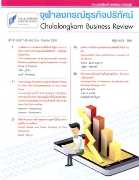The Development of Entrepreneurial Intention Model using Binary Logistic Regression: A case study of Thailand
Main Article Content
Abstract
บทคัดย่อ
การวิจัยครั้งนี้มีวัตถุประสงค์เพื่อพัฒนาแบบจำลองการทำนายความเป็นผู้ประกอบการโดยอาศัยการวิเคราะห์การถดถอยโลจิสติกทวิกับกลุ่มตัวอย่างซึ่งเป็นประชากรไทยที่มีส่วนร่วมกับกิจกรรมผู้ประกอบการจำนวนทั้งสิ้น 2,362 ตัวอย่างโดยอาศัยข้อมูลจากการสำรวจโครงการศึกษาสังคมความเป็นผู้ประกอบการระดับโลก ในปี พ.ศ. 2556 ซึ่งมีการเก็บข้อมูลด้วยวิธีการสุ่มตัวอย่างแบบหลายขั้นตอนทั่วประเทศไทยและทำการเก็บรวบรวมข้อมูลโดยการใช้แบบสอบถามเป็นเครื่องมือวิจัย ผลการวิเคราะห์ข้อมูลด้วยการวิเคราะห์การถดถอยโลจิสติกทวิ พบว่า ความตั้งใจเป็นผู้ประกอบการ สามารถอธิบายโดย ปัจจัยการรับรู้ 3 ปัจจัย ได้แก่ การรับรู้โอกาสในการทำธุรกิจ (Perception on Opportunities) การรับรู้ความสามารถของตนเองที่จะเป็นผู้ประกอบการ (Perception on Self–efficacy) ความกลัวที่จะล้มเหลว (Perception on Fear of Failure) และการมีเครือข่ายในการทำธุรกิจ (Entrepreneurial Network) โดยผู้ที่มองเห็นโอกาสในการประกอบธุรกิจ มีศักยภาพของผู้ประกอบการ ไม่กลัวที่จะล้มเหลวและมีเครือข่ายในการทำธุรกิจมีความตั้งใจเป็นผู้ประกอบการมากกว่าอีกกลุ่มที่เป็นฐาน (Baseline Category) อย่างมีนัยสำคัญทางสถิติ
คำสำคัญ: การรับรู้ แรงจูงใจ ความตั้งใจเป็นผู้ประกอบการ โครงการศึกษาสังคมความเป็นผู้ประกอบการระดับโลก การวิเคราะห์ถดถอยโลจิสติกทวิ ประเทศไทย
ABSTRACT
The purpose of this study is to develop the entrepreneurial intention model using the binary logistic regression analysis. The sample consisted of 2,362 Thai people involved with entrepreneurial activities based on the Global Entrepreneurship Monitor (GEM) data in 2013. A multi-stage sampling method was used to collect the data from five areas of Thailand using questionnaire as the research instrument. The result shows that the entrepreneurial intention is significantly influenced by three perceptions; namely, Perception on opportunities, Perception on self efficacy and Perceived fear of failure, and also Entrepreneurial network. People, who perceive opportunities of doing business, perceive their business skill, have lower fear of failure and have entrepreneurial network tend to have higher entrepreneurial intention to start up new business than those who do not.
Keywords: Perception, Motivation, Entrepreneurial Intention, Global Entrepreneurship Monitor (GEM), Binary Logistic Regression, Thailand
Article Details
Opinions and discussions in papers published by the Creative Business and Sustainability Journal (CBSJ) are deemed as personal opinions and the responsibility of the writers. They are not the opinions or responsibility of the Chulalongkorn Business School of Chulalongkorn University.
Papers, content, information etc. appearing in the Journal are deemed to be the copyright property of the Chulalongkorn Business School of Chulalongkorn University. Anybody or any organization that wishes to publish any part of them or use them in any way must obtain written permission from the Chulalongkorn Business School, Chulalongkorn University.


